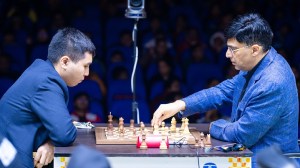LS panel recommends code of conduct for MPs
A Lok Sabha committee has recommended a broad framework of code of conduct for members but has ruled against codification of Parliamentary. privileges.

Amid growing instances of misconduct by Parliamentarians, a Lok Sabha committee has recommended a broad framework of code of conduct for members but has ruled against codification of Parliamentary privileges.
With the issue of conflict of interest gaining prominence in the post-liberalisation era, the Committee has held that provisions relating to Register of Members Interest and Guideline to members for resolution of conflict of interest should find a place in the code.
The Lok Sabha Committee of Privileges and the Committee to inquire misconduct of members of the House, headed by senior Congress member V Kishore Chandra Deo, went into these issues and presented their reports to the House on Wednesday.
As regards codification of privileges, the committee recommended against such codification. 8220;As a matter of fact and awareness needs to be created with regard to the true import of the term Parliamentary privileges and the ground realities that exists8221;. Independent member Sebastian Paul, however, gave a dissenting note to the report on the issue of codification and has favoured codification of Parliamentary privileges.
The reports have come at a time when the current Lok Sabha has witnessed expulsion of as many as 10 members in the wake of the Cash-for-Query scam and has also been rocked by the MPLADS scam. Besides one of its members has been accused of human trafficking.
The expulsions and the sting operations were unprecedented in Parliamentary history of the country.
Paul, member from Kerala, in his note of dissent wrote, 8220;I respectfully agree with the assertion of our Committee that the misuse and abuse of privileges is only a myth.
8220;But what is the difficulty in codifying the privileges except the fear that it will make privileges subject to fundamental rights and attract judicial scrutiny.8221;
In its third report on 8220;request from courts of law and investigating agencies for documents pertaining to proceedings of House8221;, the Committee has suggested that a set procedure be followed for making available documents relating to the proceedings of the House or any Committee of the House so that the sources of information are protected.
The committee also recommended that Government may bring forward an amendment to the Right to Information Act so that authorities seeking information have to depend on the jurisdiction of the House.
Deo came in for fulsome praise from Speaker Somnath Chatterjee for his leadership of the committees and the good work done by them when the reports were presented in the House.
The Privileges Committee held that there has not been any misuse of the power of privileges 8220;as erroneously believed in some quarters8221;.
To drive home its point the Committee noted that the penal powers of the House for breach of privilege or contempt of the House has been very sparingly used.
8220;During the past five-and-a half decades in the Lok Sabha, there has been only one case of admonition, two cases of reprimand and one case of expulsion for commission of breach of privilege and contempt of the House,8221; Deo told reporters after the presentation of the report.
Besides, the Committee observed that in cases of misconduct of Parliamentarians, 10 members of Lok Sabha and three from Rajya Sabha have been expelled and five members of the Lower House have been reprimanded and suspended from the membership of the House.
The Committee also noted that the British Parliament has not found it feasible so far to codify privileges.
Having regard to the declining standards of ethical behaviour of legislators, the Committee felt that it was imperative to have an effective ethics regime to regulate overall ethical behaviour and conduct of members.
8220;Effective and successful ethics regime can be built by prescribing a Code of Conduct for members,8221; it said.
The Committee said that the biggest challenge faced by it was to define the term 8220;misconduct8221; in the proposed code and subsequently felt that it may not be prudent to try to give a comprehensive definition of misconduct in the code of conduct.
In the code of conduct, the Committee said on the issue of misconduct that member shall not undertake any action that is unbecoming of MPs or which involved misuse or abuse of the powers, privileges, immunities, rights or facilities enjoyed by them.
On 8220;conflict of interest8221;, it said members shall arrange their private affairs so as to prevent conflict of interest from arising.
The code also spoke of 8216;prohibition on voting8217;. A member shall not vote on a question in the House or a Committee of the House in which he has a direct, pecuniary or personal interest.
The 14-point code of conduct for members of the House was being sent to various political parties for their opinion.
- 01
- 02
- 03
- 04
- 05































